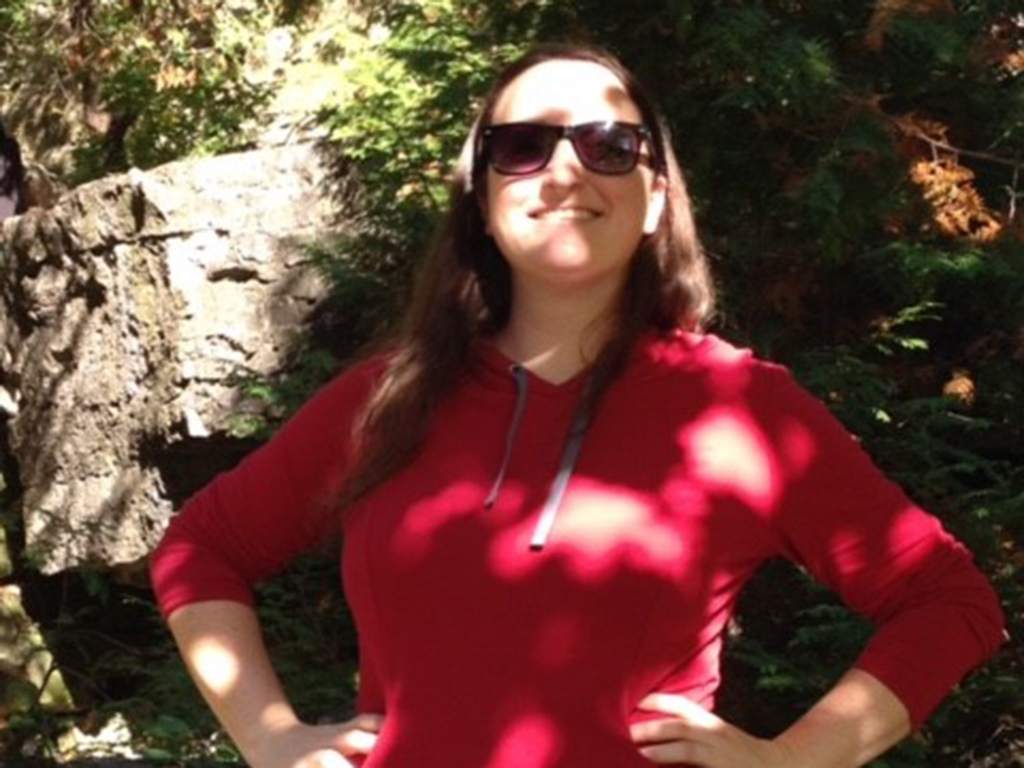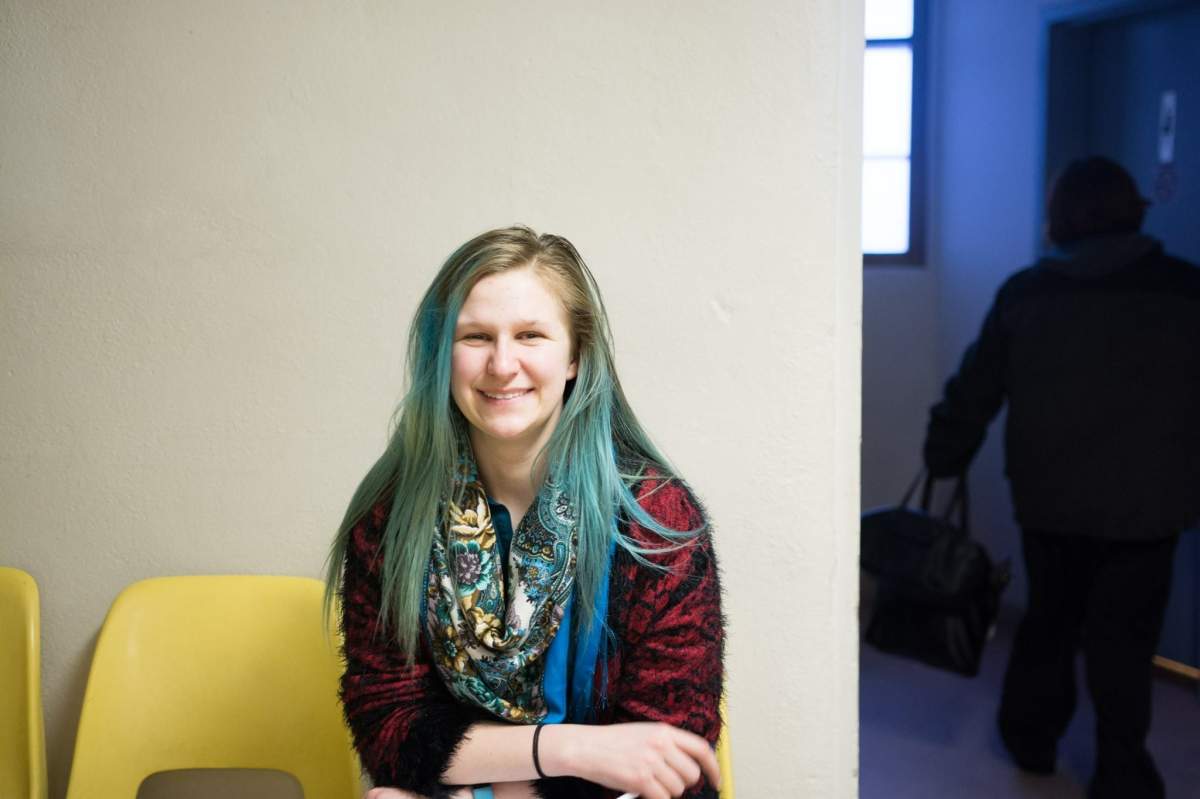Allyson Cooper was 22 when she had her first panic attack.

She was in the car with her mother after an interview at one of Canada’s top staging companies when suddenly felt overcome with emotion.
The recent graduate was diagnosed with anxiety and depression when she was 18. She did well in school and got top grades, but the moment she talked about the interview with her mother, she started to hyperventilate.
“My mom didn’t know what was going on,” she says. “She began shaking my chest and getting me to breathe.” Cooper ended up passing out in the car that May of 2007 and was taken to a nearby hospital in Aurora, Ont., a few kilometres away.
“It was just the thought of the job. I couldn’t deal,” she says.
READ MORE: How mental health should be taught in Canadian schools
Cooper ended up getting offered the job but turned it down because of her anxiety. Years later, Cooper was told by a health professional she had “high functioning” anxiety, a term that is rarely used in the medical world.
For people who label themselves with this term, it is described exactly what it sounds like: a high functioning person with anxiety who often doesn’t have any problems doing their job or socializing with others.
- Free room and board? 60% of Canadian parents to offer it during post-secondary
- Trump keeps carveout under CUSMA in new 10 per cent global tariff
- Porter flight from Edmonton loses traction, slides off taxiway at Hamilton airport
- Coffee-hockey combo — or breakfast beers? — for bleary-eyed Olympic fans
Controversy surrounding the phrase
“High functioning” anxiety isn’t listed in the DSM-5, a standard classification of mental disorders used by mental health experts.
Dr. Melanie Badali, a registered psychologist at AnxietyBC, a non-profit organization based in Vancouver, says there isn’t any research being done on the term either.
“I first started noticing [the term] in real stories by real people… you can call yourself whatever you want if it helps you communicate and connect, [but] I get concerned when the term is turned into a medical term.”

Badali says one of the reasons people may latch on to the term is because it shows a positive side to having anxiety.
What anxiety can feel like
Cooper, now 31, works as a help desk manager at an IT company in Guelph, Ont. She says anxiety can feel “electric.”

Get weekly health news
“It can feel like there is electricity pulsing through my veins and the only thing I can do to expel it is physical exertion, usually push-ups,” she says. “If I can’t get control of it, I can have full-blown attacks. I hyperventilate, lose feeling in my limbs, and, in worst case situations, can end up unconscious.”
Dr. Maneet Bhatia, a registered clinical psychologist based in Toronto, says people who describe themselves of having “high functioning” anxiety can also feel like their anxiety is a “double-edged sword that cuts both ways.”
“One one hand if you are working at a company and you’re worried about making mistakes, that’s great for your employer. You will work your butt off and spend hours perfecting your work,” he tells Global News. “But the amount of turmoil you feel on the inside when you get home is when you suffer. This is driven by anxiety and fear.”
READ MORE: What happens when mental health education isn’t taught to kids
Bhatia says common symptoms of someone living with anxiety include worrying, panic attacks, constantly feeling guilty or bad for saying ‘no,’ and sometimes having difficulty saying no to people altogether.
People who have anxiety also have catastrophic ways of thinking and usually find themselves thinking of the worst case scenarios.
And on a physical level, people can also have nail biting habits, poor sleep habits and constantly feel exhausted.
“Their mind is always racing, kind of like a timer,” Bhatia says.
Labelling yourself ‘high functioning’
Elizabeth Plishka, a 21-year-old health studies student at the University of Saskatchewan, says she saw the term “high functioning” anxiety in September 2016 after reading an article posted on Facebook. She has been living with anxiety since she was 15.
Her condition causes her to overthink or over-worry about small things, become anxious about making the right impression and sometimes, she even vomits.
“I had trouble with solely accepting I had an anxiety disorder because I was still able to function throughout school,” she tells Global News. “A lot of my anxiety comes from a place of wanting to be a perfectionist and I always thought, ‘I don’t have it as bad as that person.'”
Plishka says she didn’t reach out for help until the summer of 2016 because she always thought she wasn’t “sick enough.”
She initially contacted Saskatoon Health Region and after waiting six weeks for an initial meeting, she was later advised to seek support from her university. After another six-week wait and a consultation over the phone, Plishka says she was directed to online resources.
“I just felt incredibly hurt, betrayed and not taken seriously,” she says. “One of my concerns was, ‘well what if I am not sick enough, what if this is just me being bad at life?'”
Anxiety is a lot more prevalent on social media
For anyone who loves social media and the memes that come with it, there is a recent trend in memes about “high functioning” anxiety and mental health in general. Anxiety has become normalized and it’s not rare to see it in a humourous light.
https://www.instagram.com/p/BRmjt60BM1E/?tagged=highfunctioninganxiety
https://www.instagram.com/p/BSi8iFhj6b6/?tagged=anxiety&hl=en
But for someone with anxiety like Plishka, she says normalizing it could cause more harm than good.
“I don’t know if normalizing it is the right way to go and I try to be very careful not to diminish other people’s experiences,” she says.
But Cooper says it helps and for people who describe themselves of being high functioning like she does, it is a sign of visibility.
“Sharing my experiences made me feel less isolated. Even if it’s a viral video, I don’t think it’s a bad thing. The conversation is important, it doesn’t matter what the medium is.
How to manage anxiety
Bhatia says if you are not seeking help from a professional (although he encourages you to) there are ways to manage anxiety at home.
For starters, be mindful of your thoughts before you sleep, he says, as people tend to worry or over-analyze things before bed.
“I always tell my patients who worry at night to read a book, take a bath or take up their favourite hobby,” he says.
READ MORE: Selfies are putting young women at risk for depression, anxiety
Avoid drinking coffee and watching something distressing on TV. Do find time to eat healthy and exercise.

Cooper, who is currently on medication, says meditation and music also helps.
“I meditate every morning,” she says. “It can be guided or something as simple as listening to white noise or nature sounds.”
‘High functioning’ anxiety creates a sense of community
Similar to Cooper and Plishka’s experience with seeing “high functioning” anxiety used online for the first time, the phrase has created a sense of community for people who believe they fall under this bracket.
In September 2016, The Mighty released a video of a woman sharing her own personal story of living with “high functioning” anxiety, one that racked up 58 million views.
But Badali says we should just call it anxiety.









Comments
Want to discuss? Please read our Commenting Policy first.